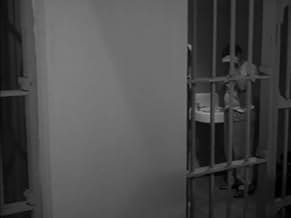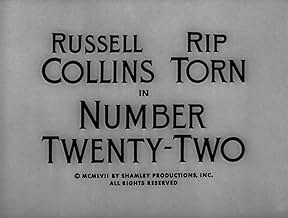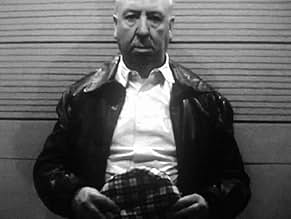Young robber Steve Morgan is in jail for his first offense and too cocky for his own good.Young robber Steve Morgan is in jail for his first offense and too cocky for his own good.Young robber Steve Morgan is in jail for his first offense and too cocky for his own good.
- Jailer
- (as Mike Ross)
- Reporter
- (uncredited)
- Prisoner
- (uncredited)
- Director
- Writers
- All cast & crew
- Production, box office & more at IMDbPro
Featured reviews
Not a Bad Acting Job
How can you go wrong with Evan Hunter (Ed McBain) and Rip Torn?
Is That a Sneer or Do You Just Like Your Teeth
As the punk, Rip Torn turns in a bravura performance. He's got a great natural sneer, and the camera knows it. At this early career stage, the cartoonish name led people to think the young actor must be some kind of joke. But as this entry, plus some 50 years of stage and screen prove, he's really a very fine actor. 'Rip' may be just a nickname, but 'Torn' is in fact his real surname.
There's also a fine supporting cast of familiar faces from the day—Teal, Sanders, Picerni, Leeds, but especially Russell Collins. Usually, he plays broken-down old men. Here, however, he's convincing as all-get-out as a savvy old con who knows how to put the punk in his place. Notably, the story is from author Evan Hunter, fresh off his triumph with the similarly delinquent-themed Blackboard Jungle, (1955). Except for Torn's eye-catching performance, however, the episode is basically an average one.
Young Rip Torn
YOUTH, ARROGANCE AND NO WISDOM.
Of course, Hitch isn't going to make him too comfortable, right?
He's equally paired with Russell Collins, playing an old timer inmate called Skinner, who offers some words of wisdom to the arrogant kid. Keep your mouth shut, and quit while you're ahead. Collins, who reminded me of actor Robert Keith, plays his grizzled role to perfection, and it would seem his character was once in Morgan's shoes a long, long time ago. But is he listening? Is anyone listening to the old man?
A superior character study written by Joel Murcott, who wrote nine episodes for the show, several others for Hitch's one hour series. Also a regular writer for the 50s cop show M SQUAD, and this story may have had some ties to it.
James Nolan, who played his fair share of cops, is cast as officer Bourne and Michael Ross plays the jailer, who ironically played numerous villains much in the style of Rip Torn's character. During the time this episode was filmed, Torn had an early role in the acclaimed film, A FACE IN THE CROWD.
Very good direction by Robert Stevens, Hitch's most distinguished director.
No mystery, no chills, but a darn good story with two fine actors chewing up the scenery. Especially Rip Torn. SEASON 2 EPISODE 21 remastered Universal dvd box set. 5 dvds. Released 2006. Love the brooding green box cover pix. A classic.
Did you know
- TriviaIn the introduction, when Alfred Hitchcock as the 'convict' in the police lineup tells the chief detective, "Wait a minute, sir. You've got the wrong man.", it's a nod to the title and plot of Hitchcock's recent film, The Wrong Man (1956), which had just been released less than two months earlier in December 1956 before the episode which was broadcast in February 1957.
- GoofsHitchcock is processed by the police in the opening scene and stands in front of a height-measuring wall chart. The announcer lists Hitchcock's height as 5 feet, 6 inches. However, the chart clearly shows that the top of his head reaches the 5 feet, 10 inches mark. But Hitchcock himself was 5'7" tall.
- Quotes
[introduction]
Narrator: [With the chief detective and another man looking on, Hitchcock is standing alone in a police lineup, wearing a checked beret and leather jacket with no tie] This is a police lineup. Here desperate criminals who have been brought to bay appear before the detective force and are questioned by the chief detective. Listen.
Chief Detective: Take your hat off.
[Hitchcock takes off his beret]
Chief Detective: Name: Hitchcock comma Alfred. Height: five foot six. Weight: prisoner refuses to make a statement. Here's his record. 1940, picked up on "Suspicion." 1942, "Spellbound." 1944, "Notorious." 1955, "Rear Window." 1956, "The Man Who Knew Too Much."
[Camera cuts to a close-up of a scowling Hitchcock]
Chief Detective: Anything to say, Hitchcock?
Alfred Hitchcock: [Speaking in a working-class accent] Well, sir, I admit it ain't a good record. But I'm trying to do better.
Chief Detective: Better? You call this latest charge "doing better"? Appearing on television!
Alfred Hitchcock: I'm sorry, sir. But my family was hungry.
Chief Detective: Now, take him away.
Alfred Hitchcock: Wait a minute, sir. You've got the wrong man. Don't you want to see a sample of me work?
Narrator: Okay, here's what we found on him when we picked him up.
- Crazy creditsIn his post-show remarks, Hitchcock called the subject of this episode - juvenile delinquency - a grave national crisis, too serious a subject for jokes. This is one of the very few times that Hitchcock ended the show on a serious note instead of his usual flippant remarks.
- ConnectionsReferences Suspicion (1941)
- SoundtracksFuneral March of a Marionette
Written by Charles Gounod
Details
- Runtime
- 30m
- Color
- Aspect ratio
- 1.33 : 1



















